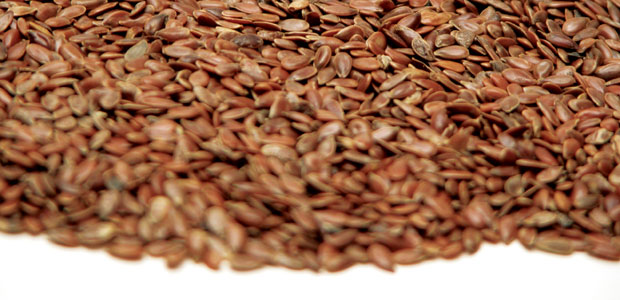Advertisement
Flaxseed’s Golden Gift
Lignans naturally occur in some plants, especially flaxseed, and are classified as phytoestrogens–plant compounds that can modulate the metabolism and use of the hormone estrogen. Flaxseed contains a concentration at least 100 times greater than other lignan-containing foods such as grains, fruits, and vegetables. We should all be interested in incorporating more lignans into our … Continued

Lignans naturally occur in some plants, especially flaxseed, and are classified as phytoestrogens–plant compounds that can modulate the metabolism and use of the hormone estrogen. Flaxseed contains a concentration at least 100 times greater than other lignan-containing foods such as grains, fruits, and vegetables.
We should all be interested in incorporating more lignans into our diet on a daily basis for a number of reasons, including its anti-cancer, hormone-modulating, and heart and bone health effects.
Compelling Anti-Cancer Agent
An impressive number of studies have shown that flaxseed lignans are potent anti-cancer agents for hormone-sensitive cancers. This is because of their ability to modulate the production, availability, and action of hormones produced in our bodies.
Dr. Lilian Thompson at the University of Toronto has performed a number of clinical trials with flaxseed in breast cancer patients. One study involved 50 women diagnosed with breast cancer. While waiting for surgery, half of the women received muffins containing 25 grams of ground flaxseed daily while the other half received ordinary muffins. The women who consumed the flaxseed muffins had slower-growing tumours than the other group.
Dr. Paul Goss at the Princess Margaret Hospital in Toronto also performed a clinical trial involving 116 women suffering from cyclical mastalgia (breast pain). Women were given either a muffin containing 25 grams of flaxseed or a placebo and were followed for four menstrual cycles. The women who consumed the flax muffins had reduced breast swelling and lumpiness and their breast pain was alleviated. Interestingly, mastalgia has been linked to the development of certain types of breast cancer.
Natural Hormone Modulator
Daily dietary intake of lignans results in hormonal changes that are beneficial to women of all ages. In menstruating women who consumed 10 grams (about 1 tablespoon) of ground flaxseed each day, significant hormonal changes have resulted. These changes are similar to those seen after consumption of soy isoflavones. Positive effects included prevention cycles in which ovulation fails to occur and fewer cycle changes, along with reduced ovarian dysfunction. This, in turn, may decrease the development of breast and other cancers.
As women reach menopause, the level of estrogens in their body decreases. Lignans can reduce menopausal symptoms, including hot flashes, sweating, and vaginal dryness. Lignans have even been proposed as an alternative to hormone-replacement therapy in post-menopausal women.
Heart and Bone Health
Both heart disease and osteoporosis are hormone-dependent diseases in that their incidence increases as estrogen decreases. Bone maintenance and loss is affected by hormonal and nutritional factors. Daily dietary intake of lignans protects against bone loss, may increase bone density, and reduces the risk of osteoporosis. It also decreases the so-called “bad” cholesterol, increases the “good” cholesterol, decreases blood pressure, suppresses the development of atherosclerosis and inflammation, and enhances blood vessel tone. Some lignans also have antioxidant effects and thus may prevent the oxidative damage that is involved in the development of many chronic diseases.
Ways to Enjoy Lignans
The light, nutty taste of flaxseed enhances the flavour of food, and adds nutritional value to your diet. Flaxseed may be eaten on its own, sprinkled on cereal, popcorn, and salads, or added to oatmeal, yogourt, and smoothies. Breads, pancakes, bagels, muffins, and cookies have more flavour, texture, and nutrition when flaxseed is added.
The Flax Council of Canada (www.flaxcouncil.ca) recommends receiving approximately 50 to 150 mg of lignans per day. This can be found in 1 rounded tablespoon (10 grams) of ground flaxseed.
Lignans are also found in other foods, so check the accompanying chart and add a variety of lignan sources to your daily diet.




